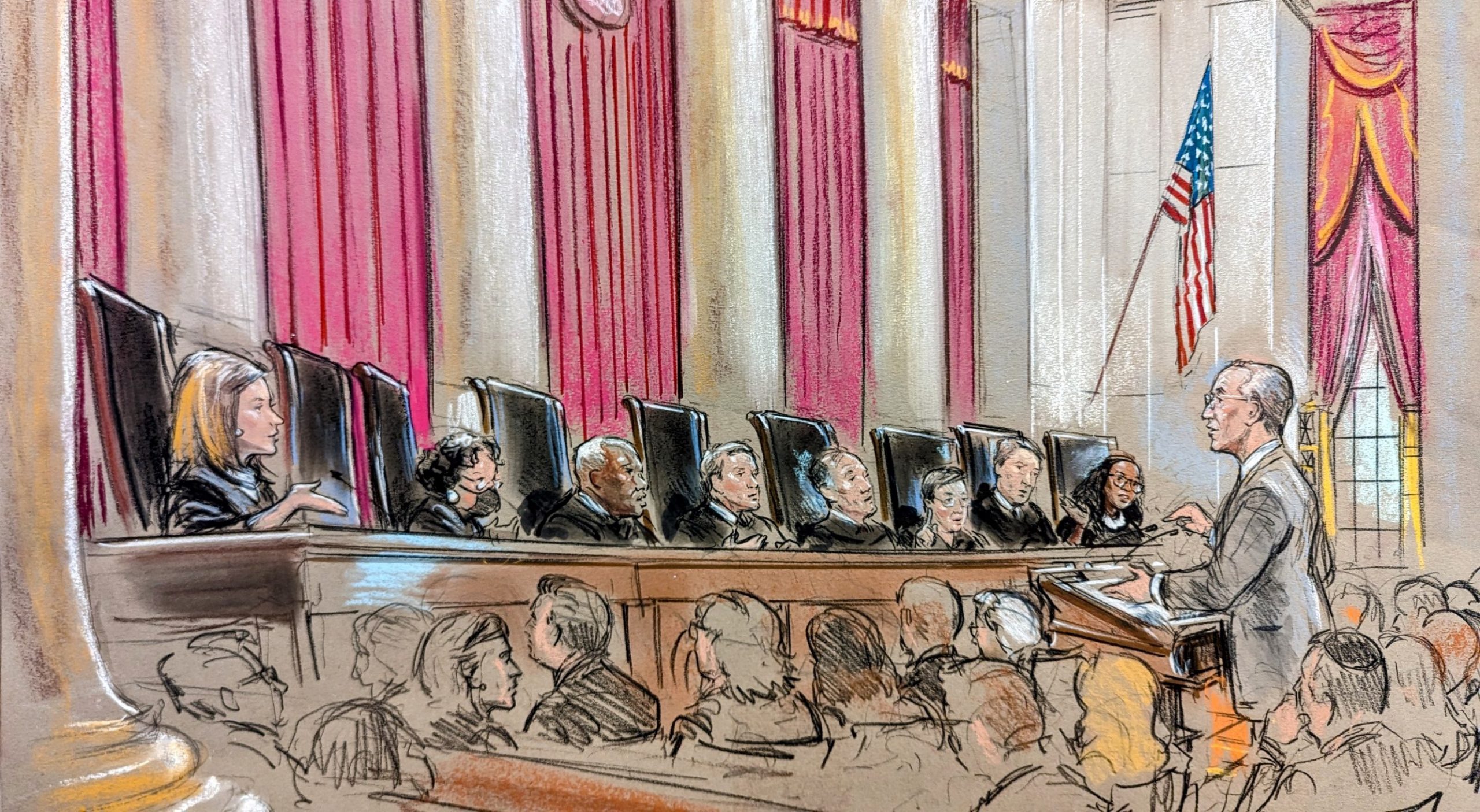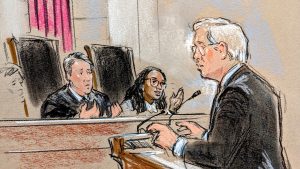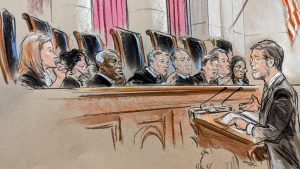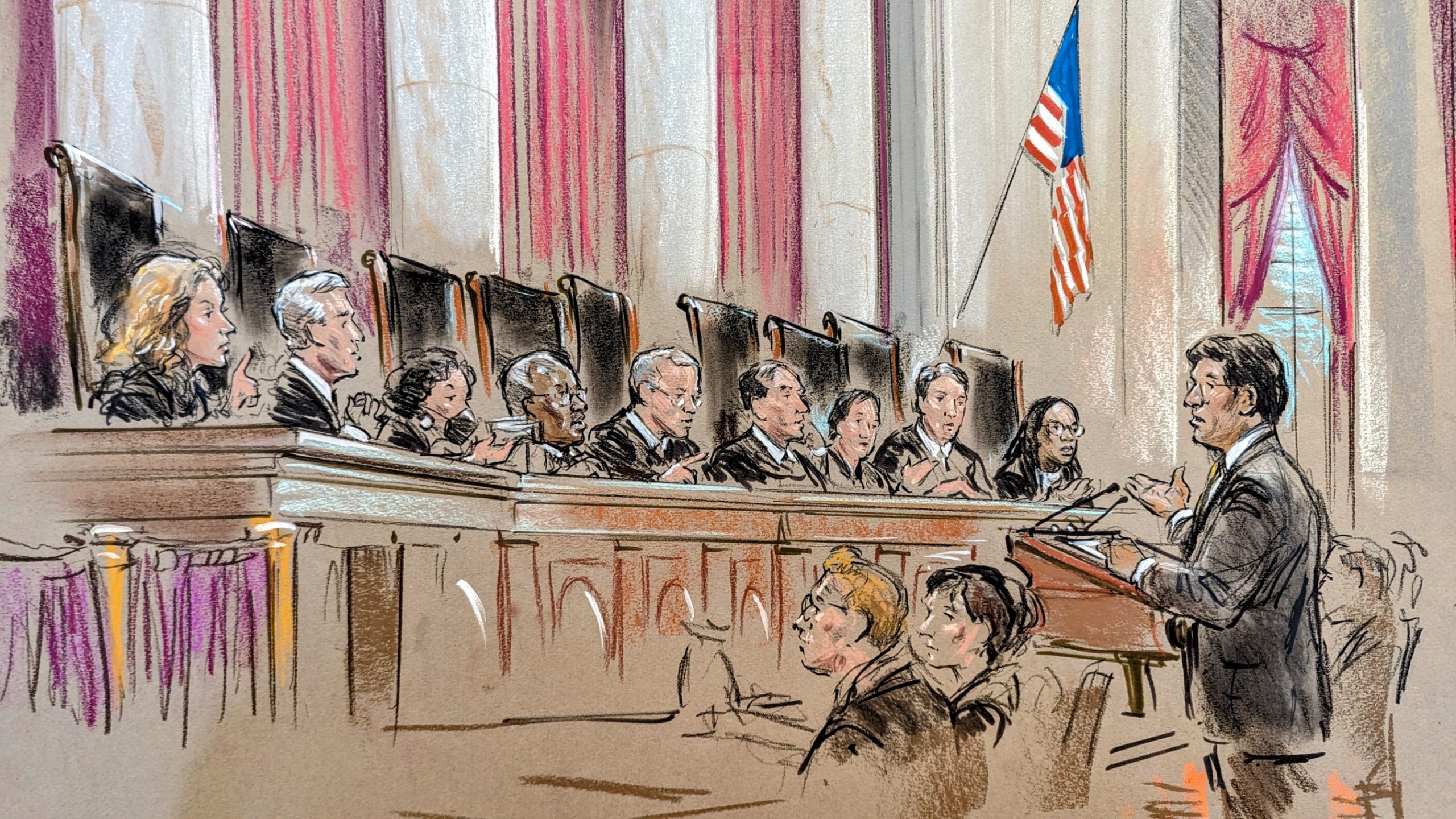In lawsuit against tech companies, justices debate what it means to “aid and abet” terrorism
ARGUMENT ANALYSIS
on Feb 22, 2023
at 4:23 pm
Seth Waxman argues for Twitter. (William Hennessy)
The Supreme Court on Wednesday appeared wary of a lawsuit seeking to hold Twitter, Facebook, and Google liable for aiding and abetting international terrorism based on ISIS’s use of the companies’ platforms. But during nearly three hours of oral argument, the justices struggled to draw a line between holding organizations responsible for supporting terrorism and allowing organizations to go about legitimate business, even if they may come in contact with terrorists as part of that business.
The dispute, Twitter v. Taamneh, stems from a lawsuit filed by the family of a Jordanian citizen who was killed in an ISIS attack on an Istanbul nightclub in 2017. The lawsuit relied on the Antiterrorism Act, which allows U.S. nationals to sue anyone who “aids and abets, by knowingly providing substantial assistance,” international terrorism. The family argued that Twitter and the other tech companies knew that their platforms played an important role in ISIS’s terrorism efforts but nonetheless failed to take action to keep ISIS content off those platforms.
When the U.S. Court of Appeals for the 9th Circuit allowed the family’s lawsuit to go forward, Twitter came to the Supreme Court, urging the justices to take up the case and reverse. The dispute is related to Gonzalez v. Google, which was argued on Tuesday and involves a separate claim that Google aided and abetted ISIS. But the issues before the court are distinct: Gonzalez is about the scope of civil immunity under Section 230 of the Communications Decency Act, whereas Twitter does not involve Section 230 at this stage of the case and instead is about whether the family’s theory of liability under the Antiterrorism Act is valid.
Representing Twitter, lawyer Seth Waxman told the court that the family’s claim that Twitter should have done more is not the same as aiding and abetting terrorism.
Eric Schnapper argues for the Taamneh family. (William Hennessy)
Justice Clarence Thomas asked the first of many questions regarding the scope of the rule that Twitter was advancing. Is the family required to contend that Twitter knew about the specific attack on the Reina nightclub in Istanbul, or that ISIS was involved in terrorism more generally?
Waxman responded that Twitter would have to know that it was providing substantial assistance to an international terrorist attack, even if not necessarily the specific attack at the Reina nightclub. He offered an analogy: The people who made the flight simulators on which the Sept. 11 terrorists trained didn’t need to know that the Twin Towers were the target of the attack to be held liable. It would be enough, Waxman said, if the manufacturers knew that the terrorists planned to use them for a terrorist attack.
But Justice Samuel Alito voiced concerns about what he described as a “line-drawing problem”: How should courts figure out when someone “knowingly” provided assistance, and what does it mean to provide “substantial” assistance?
Waxman then offered a different way to resolve the case. When the conduct at the center of the case is an allegation that the social-media companies failed to do more to prevent terrorist organizations from using the services that the companies make generally available to the public, the companies should not be held liable, Waxman contended, unless the plaintiffs allege that the companies were aware of specific accounts or posts that were used to support specific acts of terrorism.
But Justice Sonia Sotomayor objected to Waxman’s rule, telling him that such a rule would only work for Twitter’s case.
Justice Neil Gorsuch proposed what he clearly regarded as an easy solution to the dilemma before the court. Under the Antiterrorism Act, he said, individuals and companies can only be held liable for aiding and abetting a person, rather than an act of terrorism. But there is very little in the family’s complaint, Gorsuch observed, to link Twitter to the people responsible for the Istanbul attack. And such a rule more generally would operate as an “important limitation” that would prevent people and companies from being held liable “for just doing business.”
Representing the family, lawyer Eric Schnapper pushed back against the idea that Twitter was being sued for its normal business operations. Twitter knew that it was assisting terrorists, he said, and its policy of removing posts was just “window dressing.”
Schnapper insisted that a defendant can be held liable under the ATA even if it does not provide assistance for a specific attack. Because the cost of a particular attack is small compared with “overhead” costs like salaries and false documents, he explained, it is important for the court to hold that the statute applies whenever someone provides aid to any part of the terrorist enterprise. Otherwise, he warned, very little aid to terrorist groups will be covered by the statute.
Deputy Solicitor General Edwin Kneedler argues for the Biden administration. (William Hennessy)
Justice Elena Kagan appeared sympathetic to the family. She described a scenario in which a known terrorist, such as Osama Bin Laden, opens a bank account and uses the bank’s generally available services as part of his terrorist activities. She asked Edwin Kneedler, the deputy solicitor general who argued on behalf of the Biden administration, whether the bank could be sued under the Antiterrorism Act. When Kneedler responded that it could, Kagan asked why the Twitter case was different. Social-media platforms, she suggested, provide important services to terrorists too.
A few minutes later, Kagan appeared to suggest that the family’s claims should be allowed to go forward. You have said, she reminded Kneedler, “this is really a societal judgment about who counts as complicit, who counts as culpable, and that seems right to me.” But if that’s the case, she continued, shouldn’t that be a question for a jury to decide?
Kneedler disagreed, telling Kagan that it is a legal question for the court to decide. Kagan’s colleagues generally seemed to agree with him, even they did not necessarily seem to agree on exactly what legal principle they should use to resolve the case in Twitter’s favor.
This article is was originally published at Howe on the Court.








